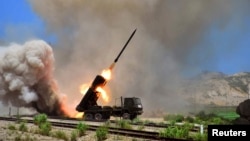Analysts who closely watch developments in North Korea say Pyongyang has made strides in missile launch systems that could deliver a nuclear warhead to targets as far away as the United States. The North's development of miniaturized nuclear devices and missile launchers capable of evading detection are raising concerns among U.S. military officials.
On Friday, Army General Curtis Scaparrotti, commander of U.S. Forces Korea, told a briefing in Washington that North Korea has the right connections and technology to develop a miniaturized nuclear weapon that can be launched from a mobile launcher.
Bruce Bechtol, an associate professor at Angelo State University in Texas and president of the International Council on Korean Studies, told VOA that North Korea observers have thought for years that the country possesses that technology.
“North Korea has a highly enriched uranium program. They probably had it weaponized by 2010. Which means they probably had a device small enough to put on a missile. probably the Nodong, four years ago,” said Bechtol.
The Nodong, or Rodong 1, is a North Korean medium-range ballistic missile that could reach targets as far away as Japan.
While the United States is concerned about the development of the miniaturized nuclear weapon, Bechtol said what is even more worrying are the plans for the KN-08 long-range missile, which could hit the Unites States, and advances in mobile missile launchers that are difficult to detect by satellite.
“The United States is very worried about this. It’s also very worried about the new long-range mobile missile that the North Korean[s] have, that is the KN-08 and I think that is something that has come as rather a surprise in the past couple of years,” said Bechtol.
In violation of the United Nations Security Council resolutions, North Korea has carried out a number of nuclear tests and short ballistic missile launches and has launched a small satellite into space.
Some groups advocating for the United States to take stronger defense measures against the growing North Korean threat say the U.S. military should take preventive action, such as preemptively bombing North Korean missile sites.
North Korea analyst Sergey Radchenko, at Britain’s Aberystwyth University, disagrees, and said a surgical strike against North Korea is out of the question because of the risk it would plunge the region into war.
“The hawks, who call for tougher measures, will be counteracted by people who will say we can’t really do it. We cannot afford to do anything because of deep uncertainty with regard to the North Korean nuclear program and the fact that they have conventional capabilities,” said Radchenko.
These analysts say the developments of miniature nukes, missiles and mobile launchers are a growing threat. But they say they expect Washington will continue to counter those threats with a strategy of maintaining a strong military presence in South Korea and using sanctions and the promise of needed aid to persuade North Korea to moderate its militaristic policies.





